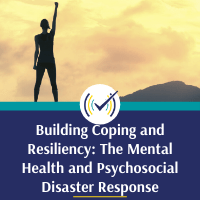This course does not offer CE Credits. The same course is available for purchase and offers 3 CE hours for behavioral health clinicians. See "related products" below.
This course covers how to respond to the COVID-19 pandemic. The identification of clients with low, moderate, and high-risk mental health symptoms is essential for identifying the symptoms that hinder personal, professional, and academic growth among school-age children, adolescents, and adults. It is critical for mental health professionals to understand the warning signs of unhealthy behavioral and mental health functioning and differentiate this from a normal response to abnormal critical life events. The intention of this presentation is focused on prevention and intervention strategies for children, adolescents, and adults who are dealing with personal and academic disruptions related to a global pandemic. Implications for present and future resources are explored. Identification and recognition of professional empathy fatigue is explored for mental health professionals.
Here is a sampling from the course:
This is a non-interactive self-study course.
Instruction consists of 3 hours of video instruction and an evaluation.
Learning Objectives:
- Identify coping and resiliency resources for clients that can serve as prevention and treatment of mental health symptoms related to the COVID-19 pandemic virus, explore the grief, loss, and psychosocial experiences associated with pandemic experiences.
- Recognize key elements of PFA, identify available tools and resources for learning and implementing PFA, and describe how PFA might be implemented with different populations during outbreak scenarios.
- Appraise salient features in the assessment, diagnosis, and treatment of posttraumatic stress, depression, anxiety, and substance use disorders, as well as suicidality.
From the time of registration, you have six months to access the coursework.
Mark A. Stebnicki, Ph.D., LCMHC, DCMHS, CRC, CMCC is Professor Emeritus and former Coordinator of the Military and Trauma Counseling (MTC) Certificate Program which he developed in 2015 in the Department of Addictions and Rehabilitation at East Carolina University. Dr. Stebnicki also developed the national Clinical Military Counseling Certificate (CMCC); a 12 hr CE program offered nationally through the Telehealth Certificate Institute. Dr. Stebnicki has been a counselor educator, researcher, practitioner with over 30 years’ experience in rehabilitation and mental health. He has practiced and published in the areas related to stress, traumatic stress, disaster mental health response, and the psychosocial aspects of chronic illness and disability. His primary focus is working with military service members, veterans, veterans with disabilities, and military families. Dr. Stebnicki has published 10 professional textbooks most recently he published two books in 2021 through the American Counseling Association/Wiley Publishing titled: Clinical Military Counseling: Guidelines for Practice and Counseling Practice During Phases of a Pandemic Virus. He also has published 40 journal articles and book chapters, and has provided over 100 presentations nationally, regionally, and statewide. He has served on many statewide and national professional counseling boards.
Captain Michael King, Ph.D., M.S.W is a social worker and epidemiologist who has worked at the intersection of behavioral and public health for over 16 years. He is Regional Administrator for the Substance Abuse and Mental Health Service Administration (SAMHSA) overseeing HHS Region IV which includes Alabama, Florida, Georgia, Kentucky, Mississippi, North Carolina, South Carolina, and Tennessee. Prior to joining SAMHSA in 2019, he supported State and Federal public health capacity at the U. S. Centers for Disease Control and Prevention (CDC) as an instructor and Field Supervisor for post-doctoral fellows enrolled in the Epidemic Intelligence Service. CAPT King previously served for over 10 years on the National Asthma Surveillance Team in the National Center for Environmental Health where his interests focused on chronic disease surveillance, environmental exposure and hazard assessment, and disaster mental health. As a Commissioned Officer in the U.S. Public Health Service, CAPT King deploys routinely following disasters and has had the privilege to lead one of five national Mental Health Response teams (Team 5) that provide crisis counseling and technical assistance to medically-underserved populations, with a focus on emergency public health response.
This course does not offer CE credits, just great content.
The same course is available for purchase and offers 3 CE hours for behavioral health clinicians. See "related products" below.
Participants may request a printed version of their certificate of attendance to be delivered by mail. A shipping/handling fee of $6.95 will be charged per request. Shipping internationally may require an additional charge.
This is a non-interactive, self-study course.
To receive your certificate of attendance you must complete the course in its entirety.
To complete a Training Video Course, one must register, log in, select the My Courses option from the menu items, click the Course Title, attend to the video content, and complete the course evaluation, then claim the certificate of attendance.
You can download or print your certificate of attendance by logging into your account, navigating to the course by selecting the My Courses option from the menu items, clicking the Course Title, scrolling to the Certificate of Attendance section, and clicking on the Certificate of Attendance link to either download it or print it.
Participants may request a printed version of their certificate of attendance to be delivered by mail. A shipping/handling fee of $6.95 will be charged per request. Shipping internationally may require an additional charge.
Directions for completing a course can be found by clicking here.
This course is intended for clinicians who provide behavioral health services.
This is a non-interactive, self-study course. Teaching methods for this course include recorded lectures, videos, and a course evaluation.
This course was recorded 5/18/2020



